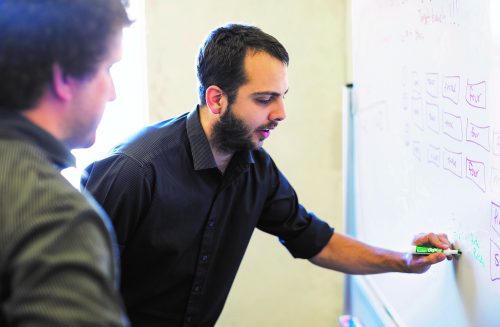By Steve Worrall, Managing Director, Microsoft Australia. This article was originally posted on LinkedIn.

Millions of Australians are today being swept up by a new industrial revolution. As the internet reigns supreme, a remarkable set of advances – including cloud-based software, web and mobile applications, data analytics, artificial intelligence and automation – are transforming the nature of work.
Much has been written in recent weeks about the need to retrain and reskill Australians throughout their lives to ensure people don’t get left behind by the digital transformation of our economy. Just last week, the Business Council of Australia (BCA), of which Microsoft is a member, released a fascinating report about the need to protect the people of Australia by ensuring “they are the most skilled, the most trained and the most resilient people on earth”, to quote the BCA Chief Executive, Jennifer Westacott.
There is no doubt in my mind that lifting Australia’s digital skills capability should be an urgent national priority. According to one forecast, up to 5.1 million jobs – or 44 percent of Australia’s existing workforce – are likely to be affected by computerization and technology over the next 20 years. Another study estimates that 60 percent of Australian students are training for jobs that will not exist in the future.
Perhaps the robots are already on the march. Yet, so far at least, the integration of digital technology within core business functions is augmenting jobs more than displacing them. Nurses are using smartphones to check patient records. Retailers are integrating physical stores with online channels. Miners are leaving quarries to work in remote operations centres. People are taking on fascinating new roles that would have sounded completely exotic a decade ago: drone operator, data policy officer, cloud architect and holoportation technician.
A recent study by Deloitte Access Economics offers additional reason for optimism. It predicts that digital technology will create an average of 20,000 local jobs each year between 2017 and 2022. Even assuming that 4,000 of these positions are destined for the nation’s graduate pool in science, technology, engineering and math (STEM) disciplines, this still leaves 16,000 jobs to be filled.
The digital economy brims with potential for Australia – if we are smart enough to seize it.
In short, the digital economy brims with potential for Australia – if we are smart enough to seize it. Warning bells should have rung in June when Australia’s global competitiveness ranking – as measured by the Swiss-based International Institute for Management Development – dropped out of the world’s top 20 for the first time in more than two decades. A key contributor was our poor performance in ensuring the digital competency of our workforce.
Clearly, Australia is in a race with other countries and our people must come together to find solutions. With this objective in mind, Microsoft recently convened a Skills roundtable in Sydney. Chaired by Sara Caplan, Chief Executive Officer of PwC Skills for Australia, the event involved 18 of the nation’s most respected thought leaders in business, education, technology and start-ups who brainstormed practical actions to prepare Australia for the new industrial revolution.
Until now, the digital skills debate has focused on helping employers source university graduates with entry-level information and communication technology (ICT) skills. While Microsoft will always be passionate about supporting young Australians’ digital literacy, it is also vital to build skills mobility for people already in work.
What I witnessed at the roundtable was a fantastic energy and enthusiasm to tackle this challenge in new ways. For example, there was much discussion about using labour market data to better connect job seekers with digital opportunities and generate insights for employers, educators and governments.
ALSO READ: Will our children be jobless tomorrow?
The roundtable participants agreed that Australia’s education system needs reform. Currently, there is too much focus on arbitrary measurements such as Australian Tertiary Admission Rank (ATAR) scores, outdated course categories and rigid graduation requirements across high schools, universities and TAFE. Instead, everyone from parents to principals and careers counsellors should be priming workers for an unpredictable future in a contingent workforce where they may have to pivot into digital roles and accept on-the-job training at any time.
This requires a nationwide shift to encouraging interoperable ‘soft skills’ such as problem-solving, critical thinking, communication and teamwork. It’s a scary thought that even tech skills have a limited shelf life. The coding capabilities being taught to primary school children today could be superseded by artificial intelligence by the time they finish high school.

In this, there are valuable lessons for all of us. Here at Microsoft, I’ve realized there is a whole set of reforms we need to consider internally. These include changing our hiring practices to prioritize job applicants’ values, skillsets and adaptability rather than their academic transcripts or formal degrees. In this context, diversity in all its forms takes on new meaning as we reimagine what our workforce will look like in future.
There are other sobering issues to consider. As Australia’s population becomes highly urbanized, the worst outcome would be for new technologies to benefit an elite few while leaving whole communities and disengaged workforces behind. Ensuring high-quality broadband throughout rural and remote Australia is vital, as is providing generous support for virtual mentoring programs and regional start-ups. This will allow people to enjoy the same opportunities whether they are in Whyalla or Wollongong.
Governments, businesses and academia all have crucial roles to play in Australia’s digital transition; no single entity can do it all.
Previous industrial revolutions have taught us that change causes great disruption and anxiety, but that life generally improves as people adapt. Now is the time for all of us to think about our own skills, the skills of our workforce, and to identify areas for growth and development to ensure everyone can participate and benefit from the digital revolution. What do you think is the answer to solving the digital skills challenge? It would be great to hear others thoughts on this topic.
ALSO READ: Measuring the digital maturity of nations





